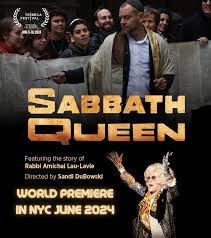
SABBATH QUEEN
US, 2024, 105 minutes, Colour.
Amichai Lau Lavie
Directed by Sandi Simcha Dubowski.
This is an unexpected documentary, filming for almost 30 years as well as incorporating footage from further back.
This is a film especially for Jewish audiences, to be condemned by Orthodox audiences, a challenge for Conservative/Liberal audiences, and acclaimed by Jewish audiences who are open to change in the 21st-century.
The film is a challenge for a non-Jewish audience, in the sense of trying to appreciate the different perspectives, to appreciate a lot of the nuances of the Jewish and the biblical traditions, the roles of the rabbis, the influence on various community is – a non-Jewish audience may feel that they are observers to the action of this story.
At the centre is a significant character, Amichai Lau Lavie. His ancestry is Polish, grandfather a rabbi who did not desert his community but was sent to a concentration camp with his two sons, one helping the other to escape and surviving. They migrated to Israel, one son becoming the chief Rabbi in Israel, statesman and ambassador (seen with a number of significant world celebrities including the Dalai Lama and Pope John Paul II). He married an English woman and they had two sons, one becoming a rabbi, then, the other, Amichai whose story this is.
While the film gives the historical background of the family, the material, filmed over the decades by the director, Sandi Simcha Dubowski, the action of the film moves around various times, later scenes illuminating what happened in the past, past scenes indicating the direction of Amichai’s life.
He identified as gay, something very difficult for his family. At age 28, he went to the United States, found a place in the gay community, took on a persona to dramatise issues, a drag Queen act, a Hungarian widow who is quite outspoken, appears at parades, at meetings, even walking into the Dea are d Sea as a gesture to free the feminine spirit under the sea.
Throughout the film there are excerpts from a long interview with Rabbi Ben, commenting on his brother’s relationship with Judaism, with orthodoxy, with the role of rabbis, his openness to other religions, his gender issues…
But, there are a lot of sequences with Amachai himself, interviews at various stages, the late 90s, 2010 and several during the succeeding decade. He is very frank in his explanations of himself, his Hungarian widow role, relationship, children through surrogacy and family life, his relationship with his brother and parents.
But, with his knowledge of the Bible, he enrols for Biblical studies with the intention of becoming a rabbi, which is also something of a contradiction for his family when he is ordained as rabbi. But, with his open outlook, he starts up a special schul, which everyone can attend, raising the issue of presiding at marriages, a case in point two gay Buddhists in New York, a Jewish woman and a Hindu man, with constant comment about biblical tradition, Jewish tradition, 21st-century, need for change and openness.
There are also some sequences of protest against him, highlighting some vicious Orthodox men and their attitude towards women (with scenes of synagogue worship, the separation between men and women), and their vicious anti-Arab protests and denunciations.
The film was being finished after the Hamas attack on Israel, October 7, 2023. Amachai returns to Israel, joins demonstrations, denouncing the bombing of Gaza, with placards urging a stand for Israel but mourning for Palestine.
Which means that this story will be an ongoing continued challenge for Jewish audiences, non-Jewish audiences observing, trying to appreciate and understand.,